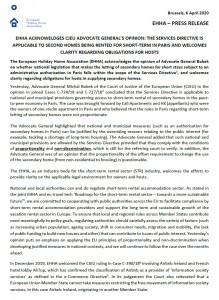 The European Holiday Home Association (EHHA) acknowledges the opinion of Advocate General Bobek on whether national legislation that makes the letting of secondary homes for short stays subject to an administrative authorisation in Paris falls within the scope of the Services Directive, and welcomes clarity regarding obligations for hosts in supplying secondary homes.
The European Holiday Home Association (EHHA) acknowledges the opinion of Advocate General Bobek on whether national legislation that makes the letting of secondary homes for short stays subject to an administrative authorisation in Paris falls within the scope of the Services Directive, and welcomes clarity regarding obligations for hosts in supplying secondary homes.
On 2 April, Advocate General Michal Bobek of the Court of Justice of the European Union (CJEU) in the opinion in joined Cases C-724/18 and C-727/18 concluded that the Services Directive is applicable to national and municipal provisions governing access to short-term rental of secondary homes in the peer-to-peer economy in Paris. The case was brought forward by Cali Apartments and HX (appellants) who were the owners of one studio apartment in Paris and who believed that the rules in Paris regarding short-term letting of secondary homes were not proportionate.
The Advocate General highlighted that national and municipal measures (such as an authorisation for secondary homes in Paris) can be justified by the overriding reasons relating to the public interest (for example, tackling a shortage of long-term housing). The Advocate General added that such national and municipal provisions are allowed by the Services Directive provided that they comply with the conditions of proportionality and non-discrimination, which is still for the referring court to verify. In addition, the Advocate General was of an opinion that the proportionality of the offset requirement to change the use of the secondary home (from non-residential to housing) is questionable.
The EHHA, as an industry body for the short-term rental sector (STR) industry, welcomes the efforts to provide clarity on the applicable legal environment for owners and hosts.
National and local authorities can and do regulate short-term rental accommodation sector. As stated in the joint EHHA and eu travel tech ‘Roadmap for the short-term rental sector – towards a more sustainable future’, we are committed to cooperating with public authorities across the EU to facilitate compliance by short-term rental accommodation providers and support the long term and sustainable growth of the vacation rental sector in Europe. To ensure that local and regional rules across Member States contribute most meaningfully to policy goals, regulating authorities should carefully assess the variety of factors (such as increasing urban population, ageing society, shift in consumer needs, migration and mobility, the lack of public funding to build new houses and other) that can contribute to issues of public interest. Yesterday’s opinion puts an emphasis on applying the EU principles of proportionality and non-discrimination when developing justified measures in national contexts, and we will continue to follow the case over the months ahead.
In December 2019, EHHA welcomed the CJEU ruling in Case C-390/18 involving Airbnb Ireland and French hotel lobby AhTop, which has confirmed the classification of Airbnb as a provider of ‘information society services’ as defined in the e-Commerce Directive. In its judgement the Court also reiterated that a European Union Member State cannot take measures restricting the free movement of information society services, in this case Airbnb Ireland, originating in another Member State.

